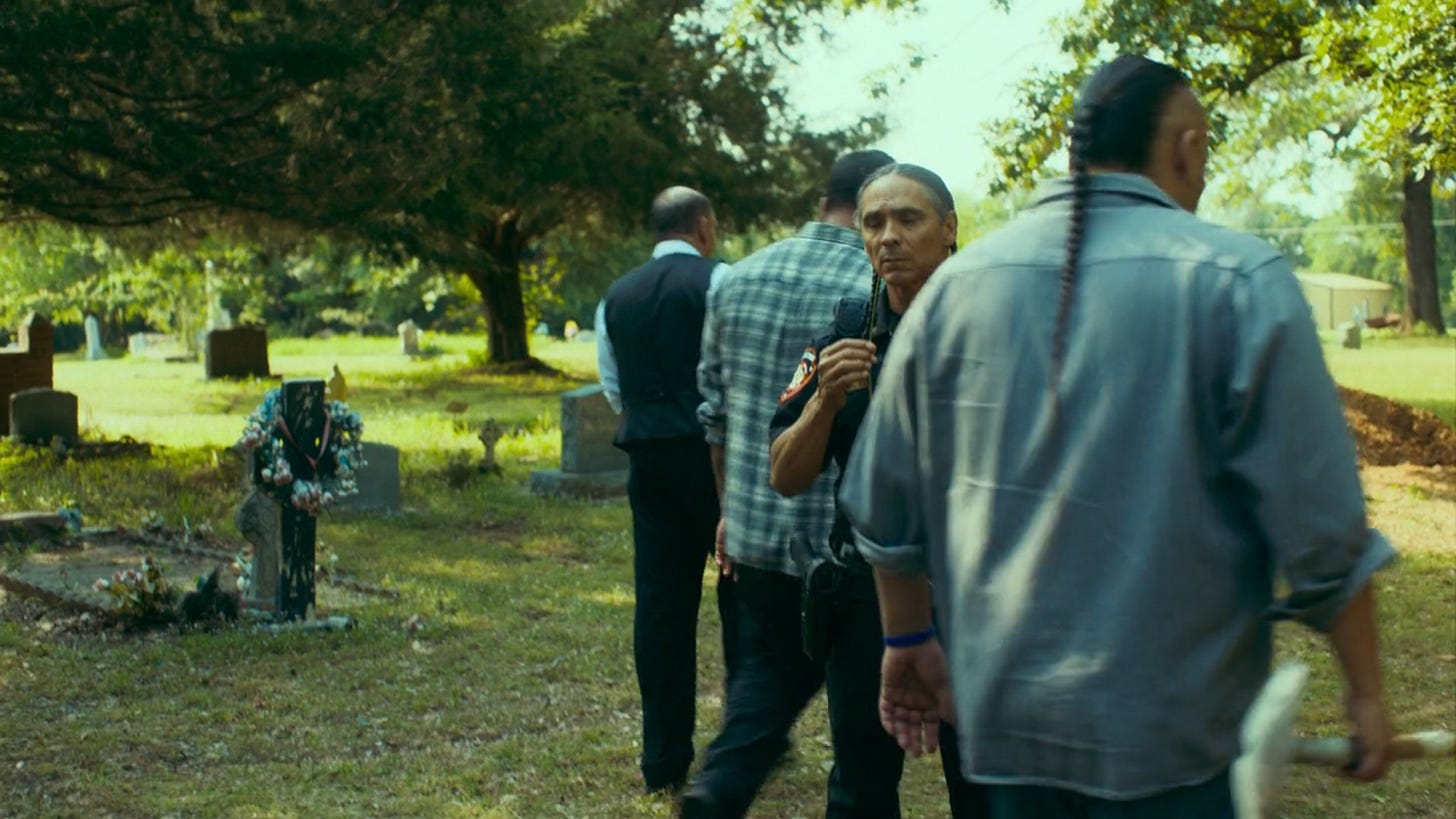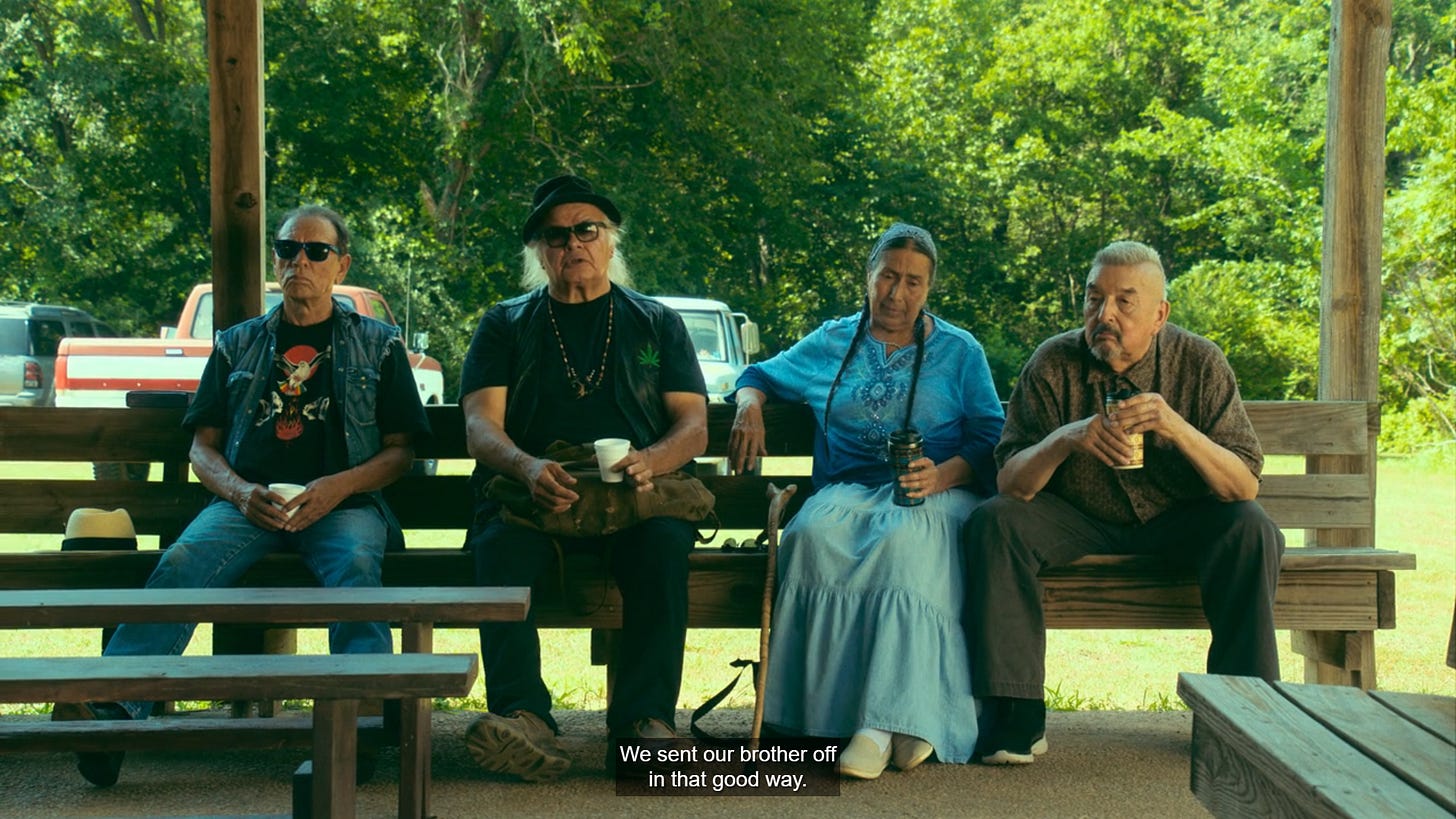What do I know about this series going into it?
I had never heard of it before. A few bits of text caught my eye while clicking through to begin streaming: it was made by Taika Waititi and involves Native Americans.
Recap
A radio broadcast quickly establishes our location: Oklahoma. A limousine drives past a school basketball court. No, it’s a prison. Inside, a young woman is visiting an older inmate, whom dialogue establishes as her aunt. The niece delivers the news that somebody died. During the conversation, the aunt is annoyed by two spirits sitting at the next table over that look like a stereotypical 19th-century cowboy and Native American.
The inmate uses the snacks on the table as a prop to philosophize about how a community works, telling her niece that she’s responsible for maintaining the community outside the prison.
Based on the tenor of the conversation I thought we would be staying inside the prison – but instead we’re following the niece, named Willie Jack. There are a series of short vignettes: Children playing a lacrosse-like game; adults failing to unload a shed from a pickup truck; Willie Jack delivering donuts and coffee to older people who complain that the donuts are “white people food”.
The community is called with bells and a horn to the funeral of the dead man, Fixico. There is a prayer (during which captions establish these characters as Muscogee), then respects are paid to the casket one by one. One mourner in a police uniform leaves a book in the casket; a later mourner takes an interest in it and steals it.
I’m starting to realize that the inmate wasn’t her visitor’s literal aunt; all the young characters call the older characters “aunt” and “uncle”, and are called “nephew” and “niece” in return.
Two characters announce they’re leaving the reservation – an older woman (Bear’s mother) to take a job in Oklahoma City, and a younger one (Bear’s girlfriend, I think) to go to college. Bear being this young guy we’ve seen a few times. During the conversation with his girlfriend, he refers to the “Rez Dogs”, establishing that the title of the series refers to an actual in-universe group of people. The girlfriend breaks down crying that she’s going to miss him.
As they’re marking out the gravesite, the cop wants to sing a song; everyone runs off before he can start.
Later that night, they dig the grave. Several young characters say they can’t wait to be elders, because the elders are sitting around doing nothing.
Over the course of the episode, the elders have occasionally warned the youngsters not to do X or Y or Z lest they call “the spirits”. They always laugh after the youngster leaves, in a manner suggesting they don’t believe the advice themselves. But Bear disobeys the advice – don’t whistle while peeing alone in the dark – and a spirit of a Native American appears to him.
Like the two from the opening scene, this spirit is dressed in 1800’s garb. No, wait, they know each other, so he must have died recently. No, wait, they know each other from previous spirit visits. Bear asks for guidance; the spirit (named William Knifeman) jokes around, messes with him a bit, and doesn’t give him explicit advice. He does however talk Bear through the realization that he wants to stay and take care of the community, but that he doesn’t need to lead it.
The burial takes place overnight, after which Willie Jack gives a little speech at the grave and everyone heads off to eat. Bear’s mother leaves for her new job. The elders say they did a good job sending off the dead, despite having not moved from the bench the entire episode.
Unresolved questions
Why do the elders disbelieve their own talk about the spirits if it’s actually true, and why was Bear so surprised that he was able to summon a spirit if he’d spoken to it before?
Who was the woman in the prison and why was she there? Did she kill Fixico?
Other than Bear and Willie Jack, who were the actual main characters of the series?
Why was a woman handcuffed to the cop and dragging him away, in a very brief scene at the very end?
Ratings
Story: 2/10. Virtually nonexistent. I get the feeling this series isn’t intended to be plot-driven, but rather to be a window into Muscogee culture.
Dialogue: 8/10. The dialogue is very effective at drawing us into the characters’ worldview and demonstrating ways in which it differs from the generalized modern American culture.
Production: 5/7. Normally I grade this out of 10 like everything else. But since I have no way of judging how effectively or accurately the show depicts a reservation, I can’t grant it or deny it any points for set design. The actors were good; nobody gave a truly standout performance, but then there wasn’t much material to work with (see below). I wasn’t a fan of the camera work.
Characterization: 6/10. With so little plot, the characters had little opportunity to demonstrate depth or dimension. But I’ve decided to grade this generously; the little that I saw hinted that there was depth there, and it was probably more visible in previous episodes.
Clarity: 3/10. At the end of the episode, I still had no idea who the vast majority of the characters were, who the “Reservation Dogs” were, or what anybody wanted in life.
Closure: 4/10. Bear came to the end of what I’m guessing was a series-long character arc. Two characters left the reservation. I’m guessing, based on dialogue, that Fixico had been a main character. But on balance this was just an episode in which a funeral took place, with nothing momentous to mark the end of three seasons.








Aho young warrior…you are wrong so wrong, the time has come the old ones said to hear of many things, of Bear and Cheese, of Elora Danan and Willy Jack, of Big and Bucky and Kenny Boy and Uncle Brownie too so sit yourself down in front of the white man’s moving picture box and they will tell you a tale of grief and sorrow and moving to California